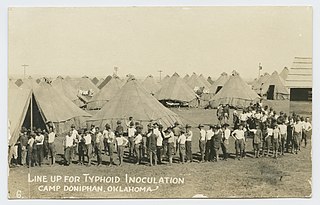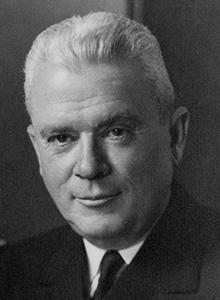
Thomas Joseph Pendergast, also known as T. J. Pendergast, was an American political boss who controlled Kansas City and Jackson County, Missouri, from 1925 to 1939.

James Francis Byrnes was an American judge and politician from the state of South Carolina. A member of the Democratic Party, Byrnes served in Congress, the executive branch, and on the U.S. Supreme Court. He was also the 104th governor of South Carolina, making him one of the very few politicians to have served in the highest levels of all three branches of the American federal government while also being active in state government.

Elizabeth Virginia Truman was the wife of President Harry S. Truman and the First Lady of the United States from 1945 to 1953. She also served as the Second Lady of the United States in 1945.
Merle Dale Miller was an American writer, novelist, and author who is perhaps best remembered for his best-selling biography of Harry S. Truman, and as a pioneer in the gay rights movement.

Harry S. Truman was the 33rd president of the United States, serving from 1945 to 1953, succeeding upon the death of Franklin D. Roosevelt after serving as the 34th vice president. He implemented the Marshall Plan to rebuild the economy of Western Europe and established the Truman Doctrine and NATO to contain communist expansion. He proposed numerous liberal domestic reforms, but few were enacted by the Conservative Coalition that dominated Congress.

The 1944 Democratic National Convention was held at the Chicago Stadium in Chicago, Illinois from July 19 to July 21, 1944. The convention resulted in the nomination of President Franklin D. Roosevelt for an unprecedented fourth term. Senator Harry S. Truman of Missouri was nominated for vice president. Including Roosevelt's nomination for the vice-presidency in 1920, it was the fifth time Roosevelt had been nominated on a national ticket. The keynote address was given by Governor Robert S. Kerr of Oklahoma, in which he "gave tribute to Roosevelt's war leadership and new deal policies."
Robert Hugh Ferrell was an American historian and a prolific author or editor of more than 60 books on a wide range of topics, including the U.S. presidency, World War I, and U.S. foreign policy and diplomacy. One of the country's leading historians, Ferrell was widely considered the preeminent authority on the administration of Harry S. Truman, and also wrote books about half a dozen other 20th-century presidents. He was thought by many in the field to be the "dean of American diplomatic historians," a title he disavowed.

This Bibliography of Harry S. Truman is a selective list of scholarly works about Harry S. Truman, the thirty-third President of the United States (1945–1953).

Camp Doniphan was a military base adjacent to Fort Sill, just outside Lawton, in Comanche County, Oklahoma, that was activated for use in World War I for artillery training. The post was closed in 1918 and incorporated into Fort Sill.

The Democratic Party's 1944 nomination for Vice President of the United States was determined at the 1944 Democratic National Convention, on July 21, 1944. U.S. Senator Harry S. Truman from Missouri was nominated to be President Franklin D. Roosevelt's running-mate in his bid to be re-elected for a fourth term.

Truman is a 1992 biography of the 33rd President of the United States Harry S. Truman written by popular historian David McCullough. The book won the 1993 Pulitzer Prize for Biography or Autobiography. The book was later made into a movie with the same name by HBO.

Alexander F. Whitney was an American railway worker who became president of the Brotherhood of Railroad Trainmen (BRT). He was an influential labor leader during the Great Depression and World War II, and in the years immediately following the war. He was the principal leader of a two-day railroad strike in May 1946 that paralyzed the nation.

James Kimble Vardaman Jr. (1894–1972) was an American lawyer from Mississippi, a US Navy captain during World War II, and political aide to President Harry S. Truman. He had worked as counsel for banks in Missouri before the war, and was appointed as a Governor of the Federal Reserve System, serving from 1946 to 1958.

Peace in Their Time: The Origins of the Kellogg-Briand Pact is a 1952 book by historian Robert H. Ferrell tracing the diplomatic, political and cultural events in the aftermath of World War I which led to the Kellogg–Briand Pact of 1928, an international agreement to end war as a means of settling disputes among nations. Ferrell's first book, Peace in Their Time elaborates on and extends Ferrell's 1951 Ph.D. dissertation, The United States and the Origins of the Kellogg-Briand Pact, which won Yale's John Addison Porter Prize for original scholarship. Peace In Their Time itself went on to win the American Historical Association's 1952 George Louis Beer Prize for outstanding historical writing. Ferrell would go on to become a professor at Indiana University and one of the most prominent historians in America, and wrote or edited more than 60 other books on historical topics. Historian Lawrence Kaplan praised Peace in Their Time as a harbinger of the high quality of Ferrell's subsequent career, stating that it "contained the special qualities that animated all his future work."

Dear Bess: The Letters from Harry to Bess Truman, 1910-1959 is a 1983 book edited by historian Robert Hugh Ferrell collecting more than 500 letters from U.S. president Harry S. Truman to his wife Bess, ranging from the couple's early courtship to his post-presidency retirement. Well-regarded by other historians, the book also achieved popular success, becoming a New York Times bestseller.

Off the Record: The Private Papers of Harry S. Truman is a 1980 book edited by historian Robert Hugh Ferrell which collects writings and correspondence by Truman, the 33rd U.S. president, between 1945 and 1971. Historian Donald R. McCoy, writing in Presidential Studies Quarterly, called it a work of "great scholarly value … which is easily one of the most important and interesting books dealing with the recent Presidency published during the past decade."

The Dying President: Franklin D. Roosevelt, 1944–1945 is a 1998 book by historian Robert Hugh Ferrell about the cardiovascular illness which Roosevelt suffered during the last year of his life and presidency. Ferrell examines the lengths to which the president and his medical advisers went to keep the public in the dark about the illness, as well as the political and diplomatic problems that arose both from the illness and the secrecy. He argues that Roosevelt was too sick to have remained in office, and that his inability to work led to critical foreign-policy mistakes in the closing year of World War II and a failure to properly prepare Harry S. Truman to take over as president after Roosevelt's death.

Choosing Truman: The Democratic Convention of 1944 is a 1994 book by historian Robert Hugh Ferrell about the political convention in Chicago which nominated Franklin D. Roosevelt for his fourth election to the U.S. presidency, but jettisoned Vice President Henry A. Wallace in favor of Missouri Sen. Harry S. Truman. The choice was particularly significant because Roosevelt would die in office the following year, making Truman the 33rd president.

Ill-Advised: Presidential Health and Public Trust is a 1992 book by historian Robert Hugh Ferrell examining politically motivated cover-ups of serious medical issues afflicting U.S. presidents while they were in office. Although Dwight Eisenhower is the main focus of the book, it covers the presidency for a century, from Grover Cleveland's mouth cancer in 1893 to the health of George H.W. Bush, then-current president when the book was first published. All of these instances, Ferrell argues, raised serious questions about the fitness of each president to hold office, as well as whether the presidents and their physicians violated the public trust in keeping the incidents secret.
The following is a list of works about the spouses of presidents of the United States. While this list is mainly about Presidential spouses, administrations with a bachelor or widowed President have a section on the individual that filled the role of First Lady. The list includes books and journal articles written in English after c.1900 as well as primary sources written by the individual themselves.

















